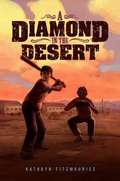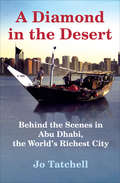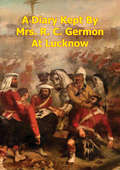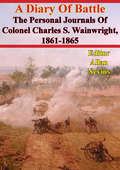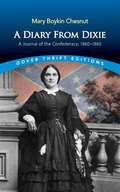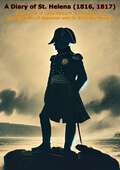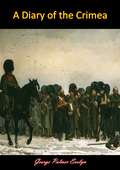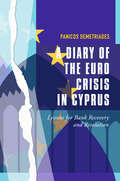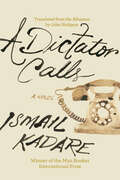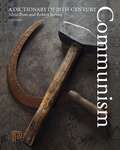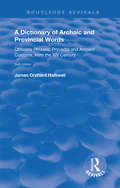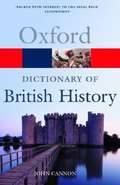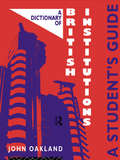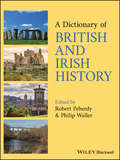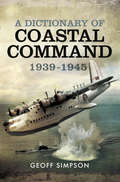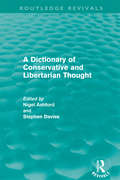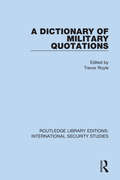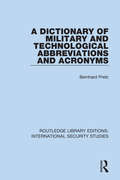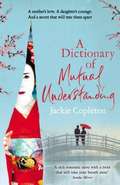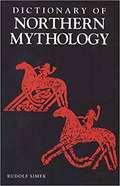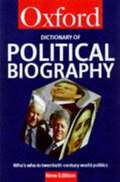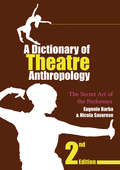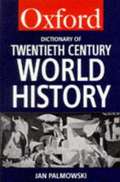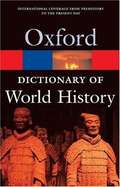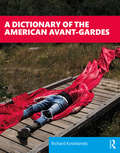- Table View
- List View
A Diamond in the Desert
by Kathryn FitzmauriceTwelve-year-old Tetsu eats, sleeps and breathes baseball. It’s all he ever thinks about. But after the bombing of Pearl Harbor, Tetsu and his family are forced from their home into an internment camp in the Arizona desert with other Japanese Americans, and baseball becomes the last thing on his mind. The camp isn’t technically a prison, but it sure feels like one when there’s nothing to do and no place to go. <p><p> So when a man starts up a boys’ baseball team, Tetsu is only too eager to play again. But with his sister suddenly falling ill, and his father taken away for questioning, Tetsu is forced to choose between his family and his love of the game.
A Diamond in the Desert: Behind the Scenes in Abu Dhabi, the World's Richest City
by Jo TatchellGet a closer look at this glittering, oil-rich city in a “revealing travelogue through the capital of the United Arab Emirates” (Publishers Weekly). Jo Tatchell first arrived in the city of Abu Dhabi as a child in 1974, when the discovery of oil was quickly turning a small fishing town into a growing international community. Decades later, this Middle Eastern capital is a dizzying metropolis of ten-lane highways and overlapping languages, and its riches and emphasis on cultural development have thrust it into the international spotlight. Here, Tatchell returns to Abu Dhabi and explores the city and its contradictions: It is a tolerant melting-pot of cultures and faiths, but only a tiny percentage of its native residents are deemed eligible to vote by the ruling class, and the nation’s president holds absolute veto power over his advisory boards and councils. The Emirates boast one of the world’s highest GDP per capita, but the wealth inequality in its cities is staggering. Abu Dhabi’s royal family, worth an estimated $500 billion, lives off the sweat of the city’s migrant workers, who subject themselves to danger and poverty under barely observed labor laws. But now, the city is making an international splash with a showy investment in tourism, arts, and culture—perhaps signaling a change to a more open, tolerant state. As this sparkling city surges into the future, it devotes just as much energy to concealing its past. Tatchell looks not only at history and social issues—the ancient system of tribal organization, the condition of the city’s million foreign workers, the emergence of women in Emirati society, but also her own experiences as both a child and adult in this fascinating city that has radically changed—and in other ways, stayed the same.
A Diary Kept By Mrs. R. C. Germon, At Lucknow, Between The Months Of May And December, 1857. [Illustrated Edition]
by Maria Vincent Germon[Illustrated with over one hundred maps, photos and portraits, of the battles, individuals and places involved in the Indian Mutiny]Maria Vincent Germon, wife of an officer of the 13th Bengal Native Infantry, survived the siege of Lucknow where 3000 people in the Residency held out against a force of 20,000 Indian soldiers and irregulars in 1857. Mrs. Germon makes the reader live alongside her through the siege and the dirt, overcrowding, boils, lice and death of friends.
A Diary Of Battle; The Personal Journals Of Colonel Charles S. Wainwright, 1861-1865
by Colonel Charles S. Wainwright Allen NevinsWhen Colonel Charles S. Wainwright (1826-1907), later a brevet brigadier general, was commissioned in the First New York Artillery Regiment of the Army of the Potomac in October 1861, he began a journal. As an officer who fought at Fredericksburg, Chancellorsville, Gettysburg, the Wilderness, Cold Harbor, Spotsylvania, and Petersburg, and who witnessed the leadership of Generals McClellan, Hooker, Burnside, Meade, Grant, and Sheridan, he brilliantly describes his experiences, views, and emotions. But Wainwright's entries go beyond military matters to include his political and social observations. Skillfully edited by Allan Nevins, historian and author of the classic multivolume Ordeal of the Union, this journal is Wainwright's vivid and invaluable gift to posterity.
A Diary from Dixie: A Journal of the Confederacy, 1860-1865 (Dover Thrift Editions)
by Mary ChesnutBorn into Southern aristocracy, Mary Boykin Chesnut (1823–86) married a rising star of the political scene who ultimately served as an aide to Confederate President Jefferson Davis. As a prominent hostess and popular guest in the highest circles of Confederate society, Chesnut possessed an insider's perspective on many of the Civil War's major events, which she recorded in vivid journal entries. Her diary recounts the social life that struggled to continue in the midst of war, the grim economic conditions that resulted from blockaded ports as well as how people's spirits rose and fell with each victory and defeat. Hailed by William Styron as "a great epic drama of our greatest national tragedy," Chesnut's annotated diary won the Pulitzer Prize for History in 1982 and served as a primary source for Ken Burns's celebrated Civil War documentary. This edition of the compelling narrative features photos and engravings from the original publication.
A Diary of St. Helena (1816, 1817) (1816, 1817) (1816, 1817) (1816, 1817): the Journal of Lady Malcolm:: Containing the Conversations of Napoleon with Sir Pulteney Malcolm
by Clementina E. MalcolmStep into a pivotal moment in history with Clementina E. Malcolm's A Diary of St. Helena (1816, 1817): The Journal of Lady Malcolm. This captivating journal offers a rare and intimate glimpse into the conversations and reflections of Napoleon Bonaparte during his exile on the remote island of St. Helena.Compiled from the meticulous notes of Lady Clementina Malcolm, the wife of Sir Pulteney Malcolm, who commanded the British naval squadron stationed at St. Helena, this diary provides an unparalleled perspective on the daily life and thoughts of the exiled emperor. Lady Malcolm's observations and detailed records of the interactions between Napoleon and her husband, Sir Pulteney Malcolm, reveal the complex character and enduring intellect of one of history's most enigmatic figures.The Diary of St. Helena covers the period from 1816 to 1817, a time when Napoleon was adjusting to his confinement and engaging in profound conversations about his past campaigns, political philosophies, and personal reflections. Through Lady Malcolm's insightful and sensitive portrayal, readers gain access to Napoleon's candid remarks and contemplations, offering a unique window into his mind during his final years.Clementina E. Malcolm's narrative captures the atmosphere of St. Helena, painting a vivid picture of the island's landscape, the daily routines of its inhabitants, and the interactions between the British officials and the French entourage. Her balanced and respectful approach to documenting these encounters ensures that both Napoleon's humanity and his strategic genius are brought to light.Join Clementina E. Malcolm in exploring the intimate and revealing moments of Napoleon's exile, and discover the profound insights contained within A Diary of St. Helena (1816, 1817): The Journal of Lady Malcolm. This diary is a timeless treasure that offers a deeply human perspective on one of history's most storied figures.
A Diary of the Crimea: The Story Of War With Russia A Hundred Years Ago
by George Palmer EvelynThis book, first published in 1954, is a fascinating first-hand account by Rifle Brigade officer of the British Army, George Palmer Evelyn, of his experiences during the war in Crimea and on the Danube between 1853-1855. These are conveyed in the form of his diary entries at the time, as well as letters and other related papers dating from 1854-1857 and 1871.Illustrated with official photographs taken during the war.
A Diary of the Euro Crisis in Cyprus: Lessons for Bank Recovery and Resolution
by Panicos DemetriadesThis book tells the story of the euro crisis in Cyprus from the inside. Written by the former Governor of the Central Bank of Cyprus, Panicos Demetriades, who was in office during this turbulent period, this book shows how the crisis unravelled through a series of key events that occurred during his tenure. Written in chronological order, and broadly based on the author's personal diary, starting from his first day in office, this volume brings together economics, banking, regulation, governance, history, politics and international relations. Presenting personal witness statements, including records of noteworthy telephone conversations, informal meetings and other milestones, it examines crucial questions like: How did Cyprus become so systemically important to the rest of the euro area? Why was Cyprus treated so differently in comparison to other peripheral countries in Europe? Why were bank depositors targeted? What role did Cyprus' links with Russia play in the design of the programme? What has been the toxic fallout from the bail-in? Are there any longer-term implications for the euro? What are the lessons for regulators around the world? The book will appeal to readers interested in financial crises, the euro's architecture, the evolution of the European Monetary Union, and those with an interest in how Europe and the IMF dealt with crises in peripheral European countries.
A Dictator Calls
by Ismail KadareUsing a sophisticated and literary version of the ever-popular game of telephone to examine the relationship of writers with tyranny, Ismail Kadare reflects on three particular minutes in a long moment of time when the dark shadow of Joseph Stalin passed over the worldIn June 1934, Stalin allegedly called Boris Pasternak and they spoke about the arrest of Osip Mandelstam. A telephone call from the dictator was not something necessarily relished, and in the complicated world of literary politics it would have provided opportunities for potential misunderstanding and profound trouble. But this was a call one could not ignore. Stalin wanted to know what Pasternak thought of the idea that Mandelstam had been arrested.Ismail Kadare explores the afterlife of this phone call using accounts of witnesses, reporters, writers such as Isaiah Berlin and Anna Akhmatova, wives, mistresses, biographers, and even archivists of the KGB. The results offer a meditation on power and political structure, and how literature and authoritarianism construct themselves in plain sight of one another. Kadare&’s reconstruction becomes a gripping mystery, as if true crime is being presented in mosaic.A little time ago the poet Mandelstam was arrested. What have you to say to that, Comrade Pasternak?
A Dictionary of 20th-Century Communism
by Robert Service Silvio PonsAn encyclopedic guide to 20th-century communism around the worldThe first book of its kind to appear since the end of the Cold War, this indispensable reference provides encyclopedic coverage of communism and its impact throughout the world in the 20th century. With the opening of archives in former communist states, scholars have found new material that has expanded and sometimes altered the understanding of communism as an ideological and political force. A Dictionary of 20th-Century Communism brings this scholarship to students, teachers, and scholars in related fields. In more than 400 concise entries, the book explains what communism was, the forms it took, and the enormous role it played in world history from the Russian Revolution through the collapse of the Soviet Union and beyond.Examines the political, intellectual, and social influences of communism around the globeFeatures contributions from an international team of 160 scholarsIncludes more than 400 entries on major topics, such as:Figures: Lenin, Mao, Stalin, Ho Chi Minh, Pol Pot, Castro, GorbachevEvents: Cold War, Prague Spring, Cultural Revolution, Sandinista RevolutionIdeas and concepts: Marxism-Leninism, cult of personality, laborOrganizations and movements: KGB, Comintern, Gulag, Khmer RougeRelated topics: totalitarianism, nationalism, antifascism, anticommunism, McCarthyismGuides readers to further research through bibliographies, cross-references, and an index
A Dictionary of Archaic and Provincial Words: Obsolete Phrases, Proverbs, and Ancient Customs, from the XIV Century (Routledge Revivals)
by James Orchard HalliwellSo far I may be permitted to speak without intrenching on the limits of criticism. A work containing more than 50,000 words, many of which have never appeared even in scattered glossaries, and illustrated, with very few exceptions, by original authorities, much contain valuable material for the philogist, even if disfigured by errors. With respect to the latter contingency, I am not acquainted with any glossary, comprising merely a few hundred words which does not contain blunders, although in many instances the careful attention of the editor has been specially directed to the task. Can I then anticipate that in a field so vast that no single life would sufice for a minute examination of every object, I could have escaped proportionate liabilities? That such may be pointed out I have little doubt, notwithstanding the pains to prevent their occurrence, but it will be manifestly unfair to make them the test of merit, or thence to pronounce a judgement on the accuracy of the whole.
A Dictionary of British History
by John CannonWhen was the first motorway opened? How did the British acquire Hong Kong? What was the book of sports? What prompted the Cat and Mouse Act? How long did the Hundred Years War last? Which queen was "nothing so fair as reported? "Drawing on the highly acclaimed Oxford Companion to British History, A Dictionary of British History, published in the very popular OPR series first in 2001 and now reissued for 2003, is a handy and invaluable reference work essential for anyone with an interest in British history and in need for a compact reference source covering 2,000 years of people, events, and places, and political, economic, local, domestic, military, and social change. In more than 3,600 entries, over 100 specialist contributors describe the people and events that have shaped and defined domestic, political, social, and cultural life in Britain over the past two millennia.
A Dictionary of British Institutions: A Students' Guide
by John OaklandFirst published in 2002. Routledge is an imprint of Taylor & Francis, an informa company.
A Dictionary of British and Irish History
by Robert Peberdy Philip WallerAn authoritative and extensive resource for British and Irish history Quickly access basic information on the history of the British Isles from this reliable resource. A Dictionary of British and Irish History provides concise information covering all periods of prehistory and history for every part of the British Isles. Within this one book, you’ll find summary accounts of events, biographies, definitions of terms, and far more. Using alphabetically organized headwords, readers will easily locate the content and details they seek. A Dictionary of British and Irish History not only serves as a reference tool, but also stimulates broader learning. Entries are interrelated and cross-referenced to help you expand your knowledge of different areas of history. Discover comparable entries on England, Ireland, Scotland, and Wales See overviews of major topics and historical events Get facts instantly or browse entries Use the Dictionary as an information source or a launch point for expanding knowledge This reference book will become an essential resource for students of British and Irish history as well as for professionals, journalists, teachers, and those who use historical information in their work. Further, anyone wanting to establish the basics of the history of the British Isles will find this a valuable addition to their library.
A Dictionary of Coastal Command, 1939–1945
by Geoff SimpsonAn alphabetical account of the part in the Second World War played by the Kipper Fleet as it was known in the RAF. Coastal Command often lacked resources compared with other home commands, giving it its other nickname of the Cinderella Service. Its main role was defensive that of protecting Britains vital sea borne supply lines in home waters as well as in the Mediterranean, the Middle East and around the coasts of Africa.Coastal Command also acted in an offensive capacity, particularly in the so-called Battle of the Barges in 1940 which helped deter Hitler from invading the UK, and in the Mediterranean and the Baltic, attacking German shipping. Coastal Command, however, is most usually remembered for the war against the U-boats, one that was eventually won.From A to Z this well-illustrated book tells the story of the gallantry, the achievements, the losses, the VCs, the aircraft and much else about RAF Coastal Command.
A Dictionary of Conservative and Libertarian Thought (Routledge Revivals)
by Stephen Davies Nigel AshfordFirst published in 1991, this is a reissue of the path-breaking Dictionary of Conservative and Libertarian Thought, the first book to examine the ideals and arguments produced by the intellectual traditions of both conservatism and classical liberalism. Covering the ideas of many such distinguished thinkers as Hayek, Scruton, Friedman and Buchanan, the volume provides a valuable survey of the historical development of both schools of thought in all of the major western countries and their contributions to contemporary debates. From American Conservatism to French Liberalism, Invisible Hand to Organic Society, from Scientism to Scepticism and Utopianism to Voluntarism, this is a vital work whose reissue will be welcomed as much by the keen layperson as by students of political science, the history of philosophy, economics and public policy.
A Dictionary of Military Quotations (Routledge Library Editions: International Security Studies #4)
by Trevor RoyleThis book, first published in 1990, is a provocative collection of military quotations that captures the human essence of warfare. From the skirmishes beneath the walls of Troy to the dropping of the atomic bomb, nearly 3,500 quotations distil the experiences of generations of soldiers, depicting the preparation for and the waging of war. Read the words of field marshals and generals, kings and dictators, and follow them into battle – Alexander the Great at Issus, Wellington at Waterloo, Sitting Bull at Little Big Horn and Montgomery at El Alamein. Here too are the recorded details of life among the ranks as diverse as ammunition and uniform, sick parade and comradeship, discipline and ‘Dear John’ letters. A final section, ‘Last Post’, deals with the tragic aftermath of conflict.
A Dictionary of Military and Technological Abbreviations and Acronyms (Routledge Library Editions: International Security Studies #3)
by Bernhard PretzThis book, first published in 1983, is a compilation of some 50,000 acronyms and abbreviations used by the British, American, German and Soviet military. It enables the researcher to understand the language of the Armed Forces, their armaments and the related technology, and to reach a greater understanding of the capabilities and duties of the Armed Forces at the end of the Cold War. The Dictionary covers all the services and their technology, and is an indispensable reference work.
A Dictionary of Mutual Understanding
by Jackie CopletonIn the tradition of Memoirs of a Geisha and The Piano Teacher, a heart-wrenching debut novel of family, forgiveness, and the exquisite pain of love When Amaterasu Takahashi opens the door of her Philadelphia home to a badly scarred man claiming to be her grandson, she doesn't believe him. Her grandson and her daughter, Yuko, perished nearly forty years ago during the bombing of Nagasaki. But the man carries with him a collection of sealed private letters that open a Pandora's Box of family secrets Ama had sworn to leave behind when she fled Japan. She is forced to confront her memories of the years before the war: of the daughter she tried too hard to protect and the love affair that would drive them apart, and even further back, to the long, sake-pouring nights at a hostess bar where Ama first learned that a soft heart was a dangerous thing. Will Ama allow herself to believe in a miracle?
A Dictionary of Northern Mythology
by Angela Hall Rudolf SimekFor two and a half thousand years, from 1500 BC to AD 1000, a culture as significant as the classical civilisation of the Mediterranean world settled an immense area in northern Europe that stretched from Iceland to the Black Sea. But the sources of our knowledge about these societies are relatively few, leaving the gods of the North shrouded in mystery.<P><P> In compiling this dictionary Rudolf Simek has made the fullest possible use of the information available -Christian accounts, Eddic lays, the Elder Edda, runic inscriptions, Roman authors (especially Tacitus), votive stones, place names and archaeological discoveries. He has adhered throughout to a broad definition of mythology which presents the beliefs of the heathen Germanic tribes in their entirety: not only tales of the gods, but beings from lower levels of belief: elves, dwarfs and giants; the beginning and end of the world; the creation of man, death and the afterlife; cult, burial customs and magic - an entire history of Germanic religion.<P><P> RUDOLF SIMEK is Professor of Medieval German and Scandinavian literature at the University of Bonn in Germany.
A Dictionary of Political Biography
by Dennis KavanaghFrom Churchill, Stalin, and Kennedy, to Blair, Clinton and Mandela, A Dictionary of Political Biography covers all the major figures in world politics of the twentieth century. Compiled by an expert team of contributors under the editorship of Dennis Kavanagh, this new dictionary contains over 1,000 entries which describe and assess the lives of the men and women who have shaped political events across the world. Each entry includes an account of the background, career, and achievements of the individual concerned, balancing fact with critical appraisal.Including entries on Idi Amin, Yasser Arafat, Dwight D. Eisenhower, Slobadan Milosevic, Francois Mitterrand, Mary Robinson, and Mao Zedong, A Dictionary of Political Biography is an indispensable and authoritative reference for anyone interested in twentieth-century history and politics.
A Dictionary of Theatre Anthropology: The Secret Art of the Performer
by Eugenio Barba Nicola SavareseFirst Published in 2005. Routledge is an imprint of Taylor & Francis, an informa company.
A Dictionary of Twentieth-Century World History
by Jan PalmowskiBiographies of world leaders such as Stalin, Kennedy, Thatcher, Yeltsin, Mandela, Rabin, and Netanyahu, as well as political events and movements, key battles, and devastating world events like the Chernobyl disaster are subjects of some of the 2,500 entries. Comprehensive attention is paid to major treaties and political agreements such as Maastricht, the Anglo-Irish Agreement, and the Dayton Accords. Several useful tables are provided, including lists of office-holders and winners of the Nobel peace prize. Annotation copyrighted by Book News, Inc., Portland, OR
A Dictionary of World History (2nd edition)
by Edmund WrightThis update of the 2000 edition brings the encyclopedic dictionary into the 21st century with new/revised information on recent historical events, e.g., the current Iraq War and biographies of such key figures as George W. Bush, Osama bin Laden, and Pope Benedict XVI. It also covers major religious and political movements, international organizations, battles, and places from prehistory to the present. The estimated 4,000 concise A-Z entries take into account new national borders, and are cross-referenced.
A Dictionary of the American Avant-Gardes
by Richard KostelanetzFor this American edition of his legendary arts dictionary of information and opinion, the distinguished critic and arts historian Richard Kostelanetz has selected from the fuller third edition his entries on North Americans, including Canadians, Mexicans, and resident immigrants. Typically, he provides intelligence unavailable anywhere else, no less in print than online, about a wealth of subjects and individuals. Focused upon what is truly innovative and excellent, Kostelanetz also ranges widely with insight and surprise, including appreciations of artistic athletes such as Muhammad Ali and the Harlem Globetrotters, and such collective creations as Las Vegas and his native New York City. Continuing the traditions of cheeky high-style Dictionarysts, honoring Ambrose Bierce and Nicolas Slonimsky (both with individual entries), Kostelanetz offers a "reference book" to be treasured not only in bits and chunks, but continuously as one of the ten books someone would take if they planned to be stranded on a desert isle.
